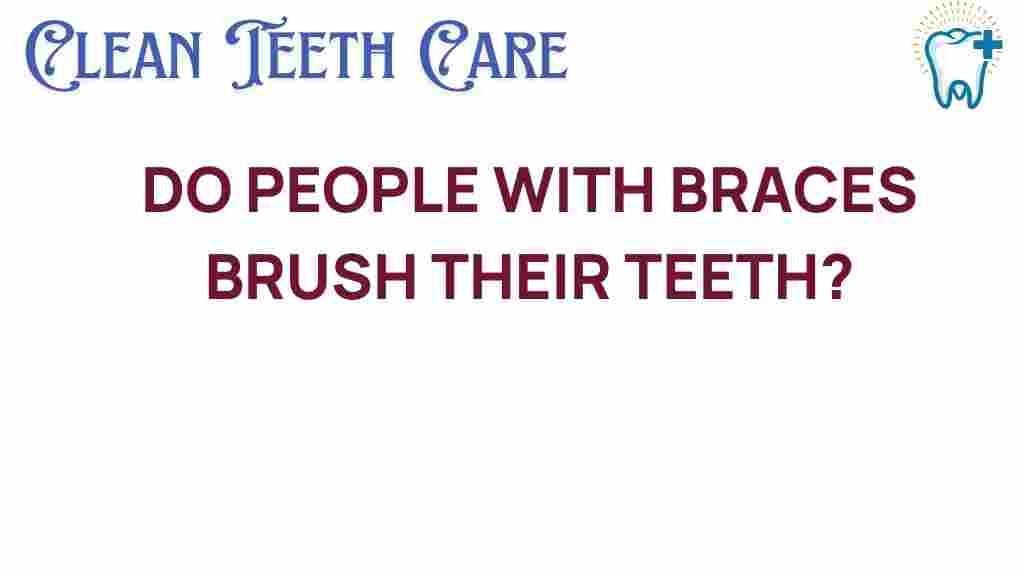Do People with Braces Really Brush Their Teeth? The Surprising Truth
When it comes to oral hygiene, individuals with braces face unique challenges that can complicate their dental care routine. With brackets and wires in place, the mechanics of teeth brushing change significantly, leading many to wonder: do people with braces really brush their teeth? The answer is a resounding yes! In fact, maintaining good gum health and preventing plaque buildup becomes even more critical for those undergoing orthodontics. In this article, we will explore the surprising truth about brushing with braces, share effective dental tips, and guide you through a step-by-step process for optimal braces care.
Understanding the Importance of Brushing with Braces
Brushing your teeth is crucial at any stage of life, but it becomes paramount when you have braces. The wires and brackets create crevices where food particles and plaque can accumulate, increasing the risk of cavities and gum disease. Here’s why teeth brushing is essential:
- Preventing Plaque Buildup: Braces make it easier for plaque to form, which can lead to cavities if not removed regularly.
- Maintaining Gum Health: Healthy gums are vital for overall oral health, especially when braces are involved.
- Ensuring a Successful Orthodontic Treatment: Proper hygiene can help ensure that your treatment progresses smoothly without complications.
Step-by-Step Guide to Brushing with Braces
To effectively brush your teeth with braces, follow this comprehensive dental care routine:
1. Gather Your Supplies
Before you start, make sure you have the following items:
- Soft-bristled toothbrush
- Fluoride toothpaste
- Interdental brush or floss threader
- Antiseptic mouthwash (optional)
2. Rinse Your Mouth
Begin by rinsing your mouth with water. This helps to dislodge any loose food particles that may be stuck in your braces.
3. Position Your Toothbrush
Hold your toothbrush at a 45-degree angle to your gums. This position allows the bristles to clean both your teeth and the area around your brackets.
4. Brush Your Teeth
Start brushing the outer surfaces of your teeth. Use gentle, circular motions to avoid damaging your gums and braces. Don’t forget to:
- Brush the front and back of each tooth.
- Brush around the brackets and wires carefully.
- Spend at least two minutes brushing your teeth.
5. Clean Between Your Teeth
Use an interdental brush or floss threader to clean between your teeth and around the braces. This step is crucial for removing plaque that your toothbrush may have missed.
6. Rinse Again
After brushing and flossing, rinse your mouth thoroughly with water or mouthwash to remove any remaining toothpaste and debris.
Common Challenges Faced by Brace Wearers
While brushing with braces is essential, it can present some challenges:
- Difficulty Reaching All Areas: The brackets can obstruct your brush’s path, making it hard to clean every surface.
- Increased Time Commitment: Brushing and flossing with braces can take longer than usual.
- Discomfort: Some people may experience discomfort while brushing, especially after adjustments.
Troubleshooting Dental Care with Braces
If you’re facing difficulties maintaining your oral hygiene with braces, consider these troubleshooting tips:
Use the Right Tools
Invest in a toothbrush designed for braces, which often has a V-shaped bristle pattern to effectively clean around brackets.
Be Consistent
Make a habit of brushing after every meal to prevent food particles from sitting on your teeth and braces.
Stay Ahead of Plaque
Consider using a water flosser to help remove plaque and debris around your brackets more effectively.
Schedule Regular Dental Visits
Regular check-ups with your orthodontist and dentist are crucial to monitor your gum health and ensure your treatment is on track. For more information, you can visit this helpful resource.
Additional Dental Tips for Braces Care
Beyond brushing, there are other important tips to enhance your dental care routine with braces:
- Avoid Certain Foods: Steer clear of sticky, hard, or crunchy foods that can damage your braces.
- Use Orthodontic Wax: If your braces are causing irritation, apply wax to the brackets to soothe your gums.
- Maintain Hydration: Drinking plenty of water can help wash away food particles and keep your mouth moist.
Conclusion
In conclusion, people with braces absolutely need to brush their teeth, and it’s vital for maintaining good oral hygiene and ensuring a successful orthodontic outcome. By following a thorough brushing routine, using the right dental tools, and implementing effective dental tips, you can keep your teeth and gums healthy while undergoing treatment. Remember to consult with your orthodontist for personalized advice and to schedule regular visits to monitor your progress. With the right care, you’ll be on your way to a beautiful, healthy smile that lasts a lifetime! For additional resources on braces and dental care, check out this informative site.
This article is in the category Hygiene and created by CleanTeethCare Team
